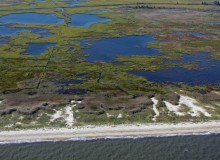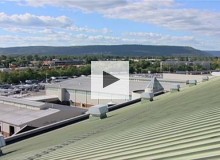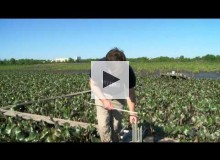Search

An aerial view of Prime Hook National Wildlife Refuge in Milton, Delaware. Wetlands, like those shown here, has many benefits for a bay's ecosystem, including filtering runoff, mitigating floods, and as a home to baby fish and invertebrates. (Photo courtesy U.S. Fish and Wildlife Service)
University of Delaware
Thursday, July 19, 2018
The health of the Delaware Bay is in question. Human activities, even those at the far reaches of a watershed, can deeply effect a bay's ecosystem. So how can we prevent more damage and work on restoration?
Tags: clean water, waterways, delaware bay, wetlands, pollution, algae, runoff, agricultural waste
Green Treks
Tuesday, June 28, 2011
At the Pennsylvania Farm Show Complex and Expo Center in Harrisburg, PA, a partnership between management, the Susquehanna River Basin Commission, Delaware Valley College, and Penn State University to manage storm water runoff is proving to be...
Tags: Garden, penn state, psu, farm show complex, pennsylvania, expo, susquehanna, rivers, basin commission, Chesapeake Bay
National Science Foundation
Monday, July 25, 2011
Villanova University marine scientist Nathaniel Weston studies how both land use and climate change can impact habitat in tidal marshes, including how rising sea levels may affect microbes and other plants and animals.
Tags: National Science Foundation, science nation, salt intrusion
National Science Foundation
Monday, January 23, 2012
Researchers have re-engineered an anaerobic bacterium known as clostridia to prevent spore formation, a change that improves the bacteria's productivity in making biofuels.



